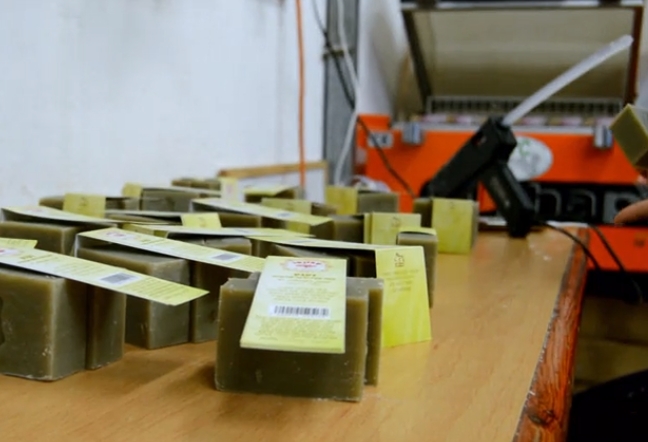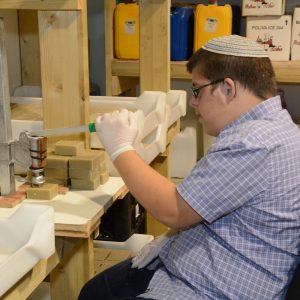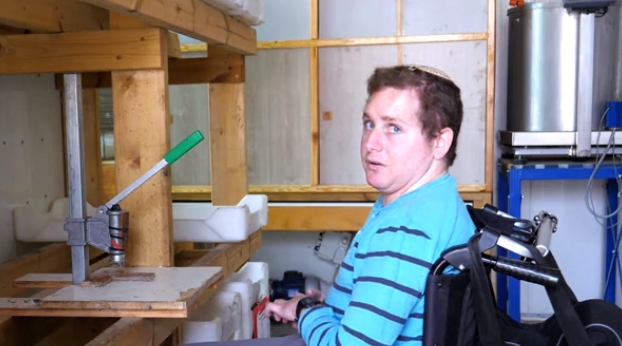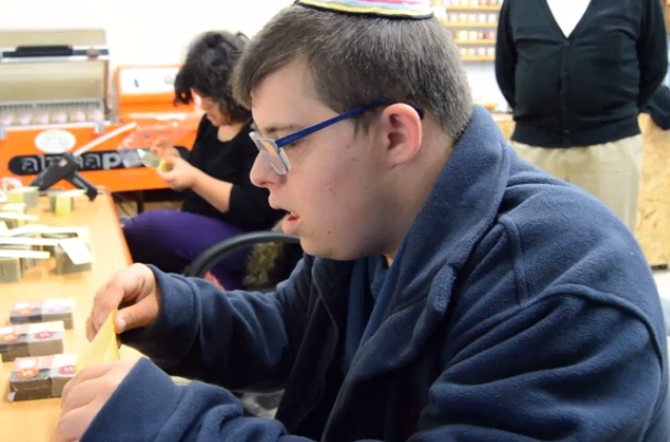"The Illuminators": What Led Shlomo Keshet to Employ Special Needs Individuals at His Factory?
The young man injured in a car accident, those with Down syndrome, and the young man paralyzed in most of his body—they and others found employment at Shlomo Keshet's 'Sabonto' soap factory. A factory established to help special needs individuals and illuminate their path.
 Shlomo Keshet and his family
Shlomo Keshet and his familyIf you enter the 'Sabonto' factory in Kochav HaShachar, you might not immediately recognize what's unique about it. Unique in every sense of the word, as the factory is distinct in that all its employees are 'special' individuals with various physical or cognitive disabilities.
At the head of the factory is Shlomo Keshet, a happy father of six boys, including Elnatan—his fourth son, who was born about twenty years ago with Down syndrome. "For years, Elnatan studied in various institutions that provided him with employment, and he was very happy there," says Shlomo. "But four years ago, we began to think about the fact that he was approaching the age where there would be no suitable institutions for him because special education frameworks only apply until the age of 21. We looked around and saw that in our entire area, which means Binyamin, Samaria, and the Jordan Valley, there was no employment solution. We quickly concluded that if we didn't create a solution for Elnatan and his friends, they would have nowhere to go. This realization was what drove us to establish the 'Sabonto' factory."
The Sabonto factory, actively operating over the past few years, is now a successful factory producing high-quality natural soaps. "Fundamentally, it's intended to provide employment opportunities for the special ones," emphasizes Shlomo, "but in the end, we produce very high-quality products, so those who purchase from us profit all around."
Setting the Suitable Bar
The idea of establishing the factory is so creative. How did you think specifically of the soap industry?
"It started quite a few years ago," recalls Shlomo. "In the past, before the evacuation from Gush Katif, we lived in the settlement of Netzarim. Shortly after the evacuation, I worked at a large olive press in Mishkei Achia, where my role included taking care of the oil aspect. Over those years, I visited hundreds of olive presses in the country and around the world, honing my expertise in olive oil production. I was already thinking about what else could be done with olive oil besides eating it. This led me to learn about soap production. About five years ago, I took it more seriously, took various courses on the subject, and concocted my own creations through trial and error."

How do the special individuals integrate into the business?
"Our goal along the way is to create very simple employment for them, to give them satisfaction with what they do, and not impose too high a standard that might frustrate them. Of course, it’s a very fine line because we also don’t want to insult them or make them feel they're doing tasks that are too simple for their level. The idea is to advance them within the possible standard."
Shlomo says based on his experience: "About three years ago, we decided to test how much we could set demands, and we assigned one of the employees a task requiring wheel operation and high skill. He didn’t succeed, so we stopped and settled for a lesser level. Today, that guy works quickly and efficiently, and it's moving to see his progress, thanks to the fact that we truly tailored it to what is right for him, to what he is capable of."
Incidentally, Shlomo notes that in terms of salary, they ensure that those who work for them earn relatively higher than anywhere else they could work. "We have inscribed on our flag that the salary should be something that honors because we do not want to embarrass or insult them in any way."
Working, Earning, and Satisfied
Shlomo tells how one of the factory's employees is Ariel Abramovich, who was severely injured in a motorcycle accident around five years ago. "Ariel lives in our settlement, and on one of the Shabbats, I saw his father bringing him to the synagogue. I noticed him and saw how significantly he raises his left hand, unlike the rest of his body parts, which are mostly paralyzed. Even then, I thought I had a perfect job for him—to stamp the 'Sabonto' logo on the soaps.
 Elnatan working at the family factory
Elnatan working at the family factory"We really did bring him to the factory, and with the function of his one hand, he manages to do the job—grabs a soap, inserts it into the stamping machine, and moves it on to the box. It’s unbelievable the satisfaction he gets from it; it gives him the feeling that he can do something and not only go from treatment to treatment and from one physical therapy to another. For his family too, it positions them differently—after years of accompanying him to treatments and hospitals, they suddenly see him getting up in the morning, going to work, earning money. You can see the satisfaction in his eyes. Just recently, he told me at the end of a work day that he didn’t want to go home but preferred to continue working."
Another employee Shlomo speaks of is a 27-year-old with Down syndrome named Yehuda Sasson. "Yehuda lives in Psagot and joined us about five months ago. He is full of life and each time succeeds in conquering more and more targets in various jobs in the factory. He is so happy to succeed, and it gives him immense satisfaction. The community and environment look at him differently too—he is not seen as a 'burden' on anyone, but on the contrary—he goes out, works, earns, and contributes."
And how about your son?
"Our Elnatan comes home on weekends and enjoys coming to look at the factory. This year he is still in a framework, and we hope that once he finishes it, we can integrate him into full-time work at the factory. He's definitely looking forward to it; he knows it's waiting for him and that he has a job prospect."
More Transparent than Glass
There is no doubt that Shlomo's descriptions are inspiring, but if we try to think about it practically, it seems incredibly difficult, almost impossible—to maintain a high-level factory with employees who don't always function fully.
"Of course, it’s not simple," admits Shlomo. "There are times when an employee suddenly has a seizure and can’t continue working. We also had an employee who simply didn’t understand why he doesn’t get paid at the end of each day, and no matter how much we tried to explain it to him, it didn’t help. Eventually, we started paying him consistently at the end of each day—there was just no choice. Some employees also suddenly need, precisely midday, a motivational talk and support, or they have to be absent for a period due to various treatments. We’ve been through it all," he smiles contentedly, "Nothing surprises us."

But how do you manage to do it, meet goals and outputs, and at the same time care for those individuals?
"I think our success is related to the fact that the factory was initially established with the intent to employ special individuals," Shlomo clarifies, "That’s how we built it and adapted our work pace and level of output. Additionally, we have volunteers who regularly come to help the employees, as most employees need one-on-one assistance, someone with them all the time. The volunteers help us a great deal."
Despite everything, Shlomo emphasizes: "There is no compromise on soap quality in any way, not the production materials or the unique production method which is done at no higher than 38 degrees, to avoid damaging the soaps. Of course, I personally handle most of the production process, as it requires a lot of precision and a high level of understanding."
And how do your customers react when they discover who is behind the soap production?
"Most of the responses we receive are positive and heartwarming. People greatly appreciate, love, and commend us. Additionally, our factory is also a tourist attraction, and often buses of tourists come to visit. Some of them encounter the special needs theme for the first time in their lives and are very moved to see such people working, functioning, and receiving equal treatment.

"Personally," he concludes, "I feel a tremendous mission here—to take people who are, according to definition, more transparent than glass, people who don’t have parliamentary representatives or others acting on their behalf and to give them here a place where they can get treated like any regular person. To understand that they are contributing, meaningful, and productive. Believe me; they don't need anything more than that."
In honor of the month of Kislev, Hidabroot is collecting stories of light and glory about people who illuminate the path. Do you know such people? You are invited to send their details to the emaildebi@htv.co.il or write about them yourself. Let's spread the great light together!

